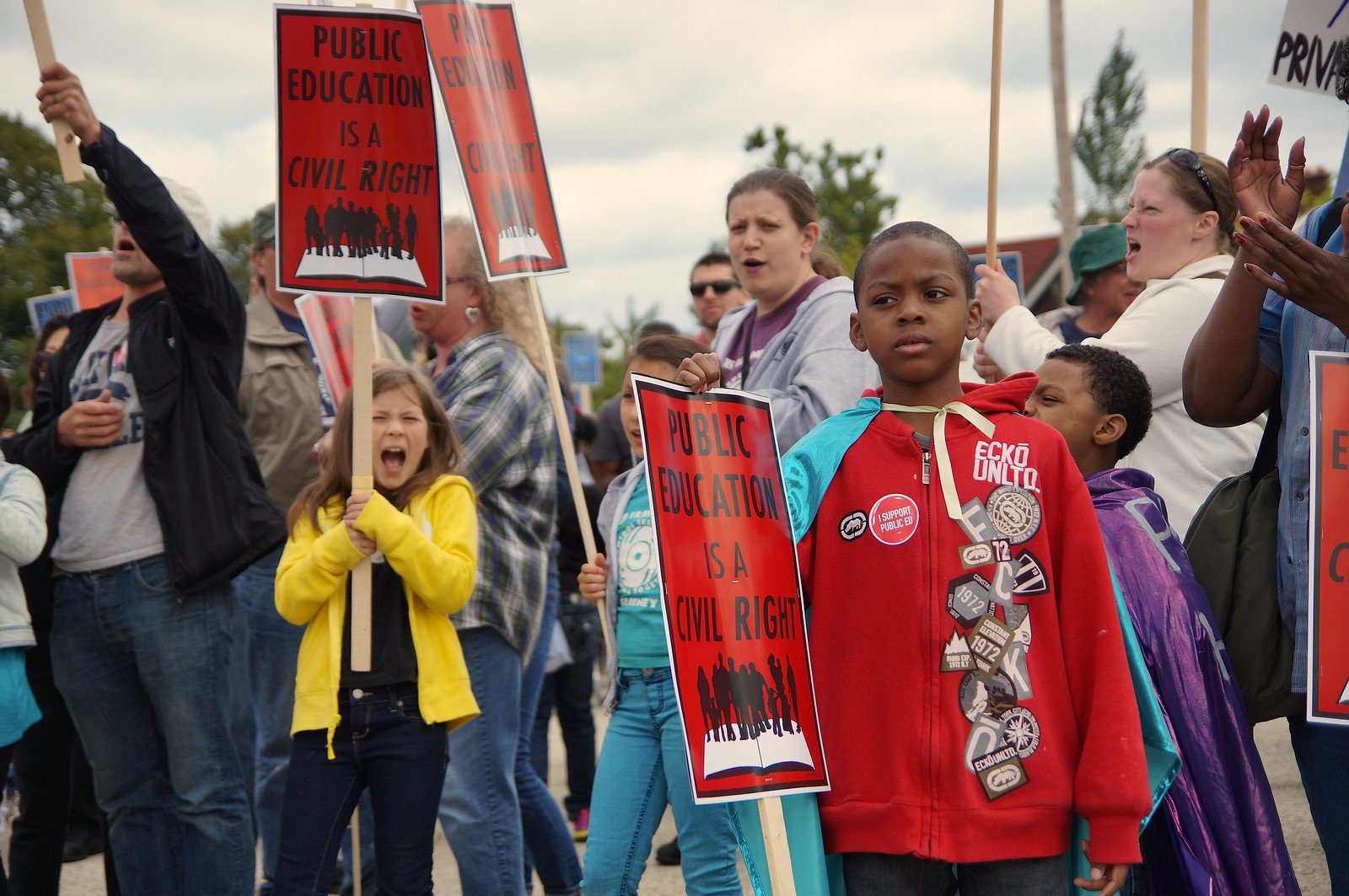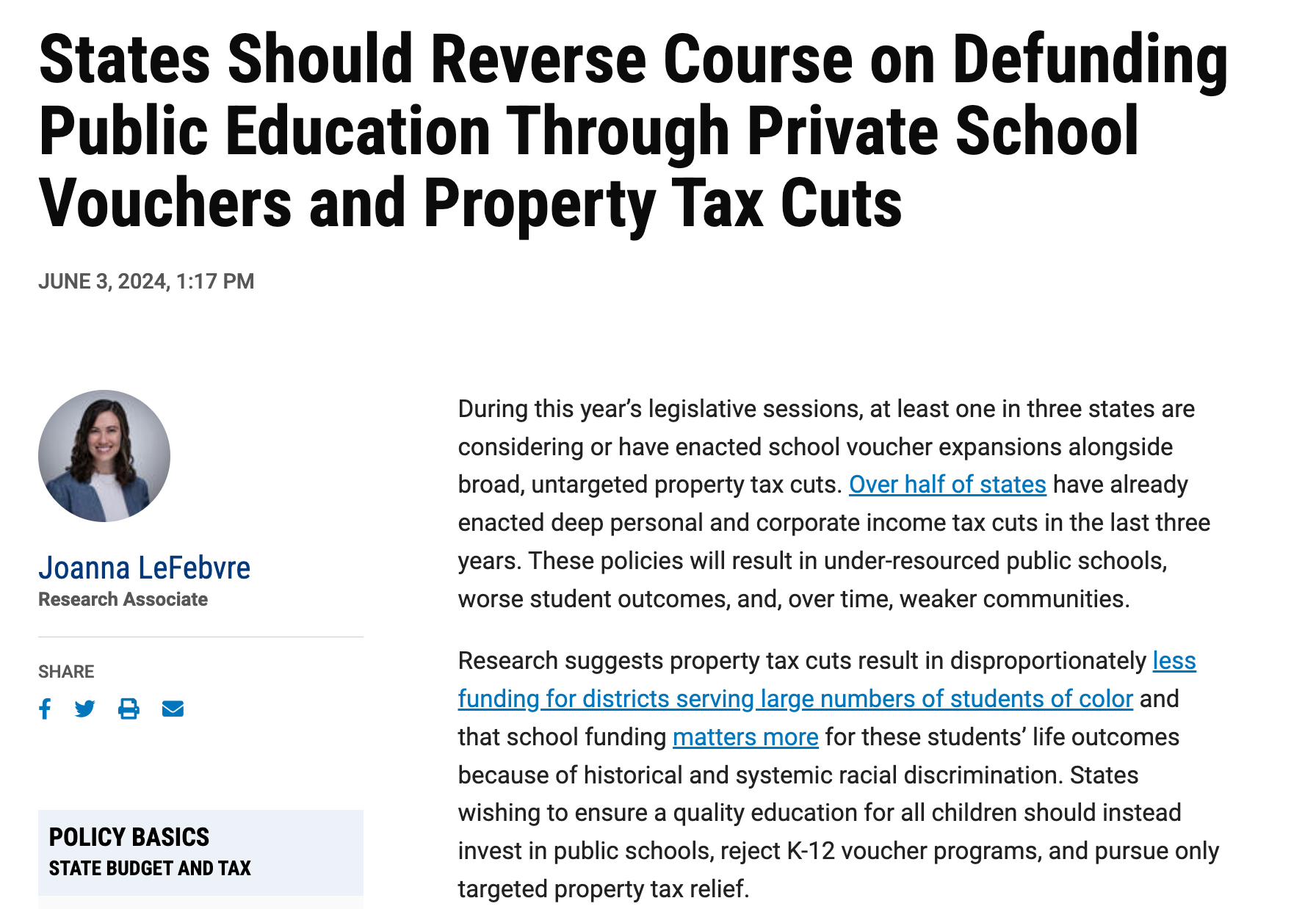
INSIGHT
Voucher programs drain funds from public education.
Voucher programs pose a significant threat to the fiscal health of state budgets and to funding for public education, which is often inadequate. Yet too many state legislatures are pouring more and more public funding into voucher programs, all while misrepresenting their fiscal impact.
The following resources explain the fiscal impact of proposed or existing voucher programs on state budgets and public education funding.
The parents of the 11,000 students who applied for grants from the newly opened vault in the state treasury are not the ones advocates tout as the beneficiary of the Education Freedom Account program if New Hampshire resembles other state’s experiences when they transitioned to “universal vouchers.”
Over half of states divert public dollars away from public schools to private schools through school vouchers. In 2024, 14 states enacted new, or expanded existing, school voucher programs, and Colorado and Kentucky are considering legalizing school vouchers through ballot measures. For example, Florida will spend almost $4 billion on its school voucher program this year, an amount that could easily replace Florida’s total annual ESSER loss if invested in public, rather than private, schools.
The center had played a key role in bringing about one of the most dramatic expansions of private-school vouchers in the country, making it possible for all Ohio families—even the richest among them—to receive public money to pay for their children’s tuition. In the mid-nineteen-nineties, Ohio became the second state to offer vouchers, but in those days they were available only in Cleveland and were billed as a way for disadvantaged children to escape struggling schools. Now the benefits extend to more than a hundred and fifty thousand students across the state, costing taxpayers nearly a billion dollars, the vast majority of which goes to the Catholic and evangelical institutions that dominate the private-school landscape there.
Pennsylvania Gov. Josh Shapiro is being eyed as a potential Democratic vice presidential nominee, but with that attention has come intense scrutiny of his support for a traditionally conservative idea: taxpayer-funded private school vouchers.
Charlotte Christian School states on its website that all families applying for financial assistance for the 2024-25 school year must also apply to North Carolina’s Opportunity Scholarship program. The same is true of Trinity Academy in Raleigh, North Raleigh Christian Academy and many other schools in the state that accept voucher payments.
An effort to expand a North Carolina program that uses taxpayer dollars to send students to private school collapsed in the statehouse as lawmakers drew the short legislative session to a close on Thursday.
Republican leaders of the state House and Senate had hoped to expand the Opportunity Scholarships program and had earmarked more than $460 million for the program in separate budget proposals. But negotiations fell apart between the chambers as they tried to figure out how to spend a $1 billion surplus.
Moms are allegedly at the center of a rightwing campaign attacking public schools and advocating for school vouchers. The latest entry in the “moms space” is called Moms on a Mission, which the organization’s website reveals is an offshoot of the Betsy DeVos-controlled American Federation for Children (AFC).
Vouchers emerged in the United States as a tool to combat public As pro-public education groups plan a rally at the Pennsylvania State Capitol, educators and advocates on Friday criticized hip-hop icon Jay-Z's company Roc Nation over a campaign backing a proposed school voucher program in the commonwealth.
The campaign's "Dine & Learn" events in Philadelphia this month are intended to share information about the Pennsylvania Award for Student Success (PASS) or "Lifelife Scholarships," as supporters also call them. If approved by state legislators in the next budget, the program would put tax dollars toward "education opportunity accounts" for certain families to send their children to K-12 private schools rather than low-performing public ones.
Over the past two years, school voucher systems and other related schemes that divert taxpayer revenue toward private K-12 tuition have passed state legislatures at unprecedented rates. Although these recent bills became law only, for the most part, in red states, their supporters include a handful of Democrats in other parts of the country as well. And all of this comes despite a decade of evidence that vouchers have led to some of the steepest declines in student achievement on record.
During this year’s legislative sessions, at least one in three states are considering or have enacted school voucher expansions alongside broad, untargeted property tax cuts. Over half of states have already enacted deep personal and corporate income tax cuts in the last three years. These policies will result in under-resourced public schools, worse student outcomes, and, over time, weaker communities.
Over the past 12 months, the decades-long push to divert tax dollars toward religious education has reached new heights. As proclaimed by EdChoice—the advocacy group devoted to school vouchers—2023 has been the year these schemes reached “escape velocity.” In strictly legislative terms, seven states passed new voucher systems, and ten more expanded existing versions. Ten states now run eleven universal voucher programs, all of which have no meaningful income or other restrictions.
Private school choice is having quite a moment. Whether structured as traditional school vouchers paying direct appropriations for private tuition, scholarships funded by redirected state income tax liabilities, or as new education savings accounts (ESAs), the use of public funds for private schooling has never been more prominent. In 2023 alone, seven states passed new programs and nine expanded existing plans. This push is largely a red state phenomenon. Of the new or expanded private choice states, all but two went for Donald Trump in the 2020 election.
Tennessee Gov. Bill Lee and Republican leaders — predicting passage of a private-school voucher bill in 2025 — will have to outflank conservative groups as well as opponents such as the Tennessee Education Association.
Make no mistake – this bill would create New Jersey’s first and only PRIVATE SCHOOL VOUCHER program. Do not be fooled by code words like “scholarships” and “student support organization” and “tax credits.” As one court put it when striking down a similar tax credit voucher law, the program’s unconstitutionality could not be “evaded through the mechanism of funding this program from a tax credit rather than by a direct appropriation of tax dollars.”
In North Carolina and Kentucky, public schools are the center of our communities. We’re proud public school graduates ourselves – and we know the critical role our schools play in teaching our students, strengthening our workforces and growing our economies.
In some states, higher-income families can now use taxpayer money to cover private school tuition -- and more people than projected are taking the offer, which might force scrambles to shore up state budgets. It’s especially an issue in states like Arizona and Iowa, where at least some families whose children were already in private school can now take advantage of public funding.
Georgia senators gave final approval Wednesday to a plan to create a $6,500 voucher funding for private school tuition and home schooling, sending the measure to Gov. Brian Kemp for his signature.
Voucher expansions have unleashed a flood of additional taxpayer dollars to the benefit of families already enrolled in private schools. In Ohio, some schools are now “strongly encouraging” parents to apply for vouchers, regardless of need or income.
One of the most disturbing recent shifts in U.S. public policy has been the renewed push to privatize the nation’s K-12 education system.[1] Originally born out of a desire to preserve school segregation and racial inequality more broadly, the so-called “school choice” movement is enjoying a resurgence as many state lawmakers look for ways to move more kids into private and religious schools.[2] That end is being hastened through the tax code in major ways. In short, school privatization proponents have managed to set up state policies that harness deficiencies in federal tax law and the self-interest of wealthy families to gin up enthusiasm for privatizing the U.S. public education system.
Tennessee should fight back against the voucher scheme. Invest richly in local public schools as the most important economic driver for your state.
Public school advocates have long argued that attempts to inject free market ideology and mechanics into education are misguided and destructive because the free market is a bad fit for universal public education. But in a new paper, Douglas Harris argues that the reverse is true: schooling is a bad fit for free market logic.
Make no mistake – this bill would create New Jersey’s first and only PRIVATE SCHOOL VOUCHER program. Do not be fooled by code words like “scholarships” and “student support organization” and “tax credits.” As one court put it when striking down a similar tax credit voucher law, the program’s unconstitutionality could not be “evaded through the mechanism of funding this program from a tax credit rather than by a direct appropriation of tax dollars.”
It is School Choice Week, and the usual suspects are pressuring Congress to pass a national tax-credit voucher bill called the Educational Choice for Children Act (ECCA).The ECCA would give tax credits to individuals and corporations who donate to tax-exempt organizations that provide scholarships to K-12 students to attend private schools. Donors could receive up to a $5,000 tax credit, potentially draining our national treasury of up to ten billion dollars this year. That is the 2024 cap.
State lawmakers are considering legislation that would expand the Missouri Empowerment Scholarship Accounts Program, or vouchers. The expansion of school vouchers and associated tax credits would divert state funding from local, neighborhood public schools.
This graphic documents how Florida’s school voucher program has evolved from a small program for students with disabilities to a program that costs Florida taxpayers $4 billion.
This report by Public Funds Public Schools (PFPS) and the Idaho Center for Fiscal Policy (the Center) explains why Idaho policymakers must continue to reject proposals for private school vouchers and instead invest in the state’s underfunded public education system, which serves the vast majority of children.
As people reach for social justice and better lives, they create public goods--free education, public health, open parks, clean water, and many others--that must be kept out of the market. When private interests take over, they strip public goods of their power to lift people up, creating instead a tool to diminish democracy, further inequality, and separate us from each other.
Florida receives an F on an A-F scale on all three funding metrics: funding level, funding distribution, and funding effort.
Since 2019, the flow of public funds to private education dramatically increased after the State Legislature enacted the Family Empowerment Scholarship (FES) program.
The Georgia Senate recently passed a bill that would funnel public state dollars to private schools. Senate Bill 233 would create a promise scholarship account (PSA), another name for a voucher, for families to pay for private school tuition or qualified education expenses with funds from the state government.[1] The bill would set aside $6,000 per academic year into a “consumer-directed account.” A family’s acceptance of these funds would act as a refusal of federal protections for students with disabilities and state laws for an adequate public education, such as background checks for teachers.
These slides from the North Carolina Justice Center show the fiscal impact of North Carolina’s Opportunity Scholarship voucher program.






























